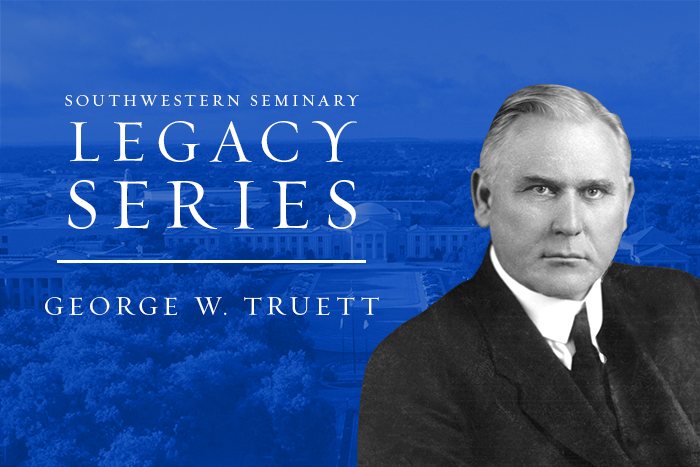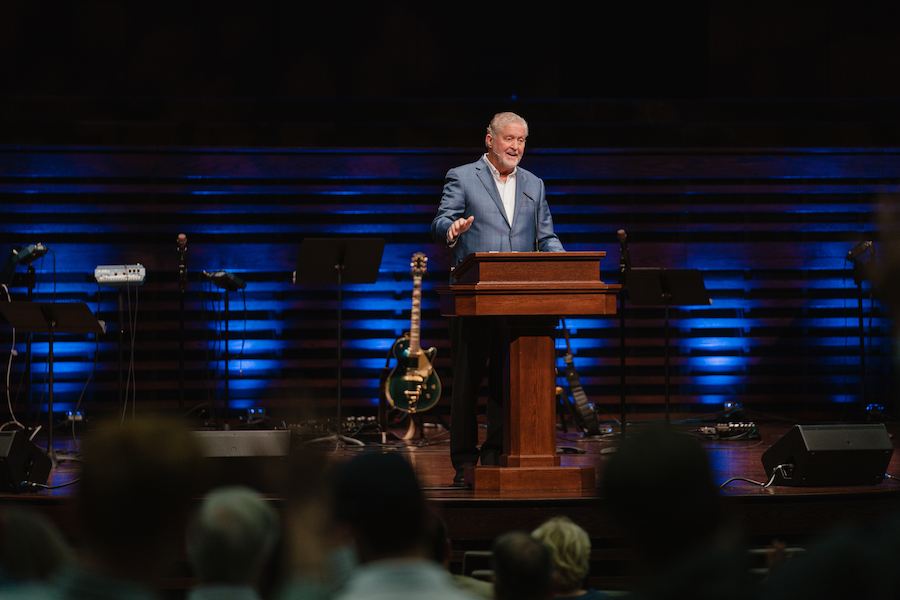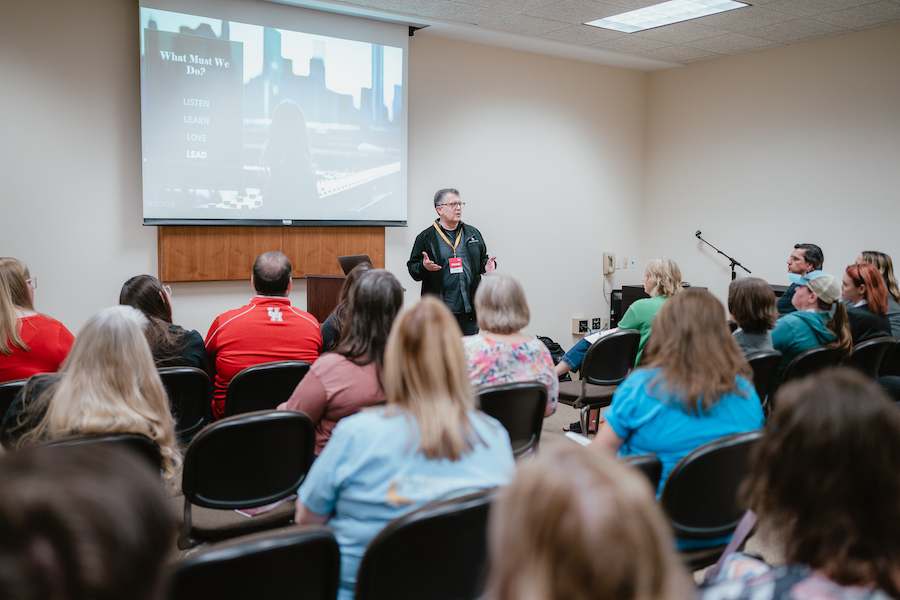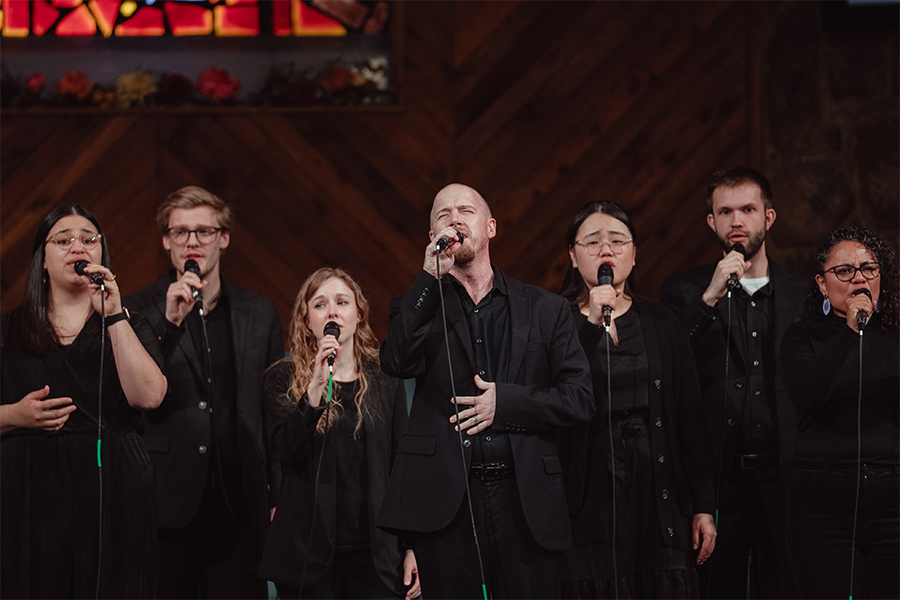SWBTS Legacy: George W. Truett


During the early 20th century, George W. Truett would become one of the most renowned preachers, sought out for his preaching and spiritual leadership. He was a commanding and influential figure, yet he often described his role as the “humblest little spot in all the world.” Though he would become known for his oratory skills, as a young teacher and principal to a remote Georgia mountain school, Truett’s sights were set elsewhere, and he never thought much of his speaking abilities.
Yet it was during a gathering of the 1888 Georgia Baptist State Convention that a young and unassuming Truett was called to give an impromptu speech before a group of leaders and plead the case for financial support of rural mountain schools and their students seeking further education.
“Brethren, this is George Truett. He can speak like Spurgeon,” said the Reverend Fernando C. McConnell. “George, tell them what the Lord has done for you, and what you are trying to do up in the mountains.”
In the two years prior, the 18-year-old Truett had begun teaching in a one-room school and then founded the Hiawassee Academy, a rural mountain school where he served as principal. Truett viewed teaching as a special opportunity to pass on his love for knowledge to other students while simultaneously earning money to fund a future law degree.
Initially embarrassed by the invitation to stand before the Georgia leaders, once Truett began to speak, he quickly found his voice, advocating for the aspiring young people of the mountains.
As Truett shared his own experiences learning and teaching in that very region, the audience quickly realized the natural talent of the speaker before them. Truett’s voice was steady and commanding as he delivered a message so compelling that men immediately opened their pocketbooks to ensure the future of mountain schools.
This same man who could “speak like Spurgeon” and who had moved an entire room of men to action would later go on to command the attention of millions worldwide. Truett’s seemingly natural and God-given ability to inspire men and women to act would be a hallmark of his 50-year ministry as preacher and denominational leader. Truett had a global reach and was influential in the Southern Baptist Convention, but he always had a special relationship with Texas Baptists, including the Southwestern Baptist Theological Seminary.
‘I was thrown into the stream and just had to swim.’
In his earlier years, Truett would continue to receive praise for his keen ability to capture the attention of a crowd like any of the best preachers. But Truett was never one to accept such praise, a characteristic he learned from his childhood years in South Carolina.
Among the many Christian influences in his life, Truett’s mother was likely the greatest. Truett often found his mother praying for the salvation of her children and husband, and she later confessed that she often prayed for God to call Truett to the ministry. In an answer to those fervent prayers, Truett professed faith in Christ at age 18 and would eventually forgo a career in law to pursue ministry.
Truett eventually followed his family to Texas, where he joined the Whitewright Baptist Church. Truett taught Sunday School and regularly filled in on Sundays when the pastor was away, and it was not long before these Texas congregants noticed the same talent first witnessed by those Georgia pastors.
Church members often discussed his talent amongst themselves and even told Truett he ought to be a preacher. Even so, Truett maintained that he aspired to be a lawyer.
However, the congregation was convinced that it was God’s will for Truett to be a preacher. During a Saturday church meeting in 1890, Truett entered the church sanctuary and immediately noticed the strange sight of a full room that was usually sparse for such meetings.
During the meeting, a deacon made a motion that “this church call a presbytery to ordain Brother George W. Truett to the full work of the gospel ministry.” The motion was promptly seconded, and the people voted in favor of Truett’s ordination.
Shocked and embarrassed by this act, Truett stood before the church and pled for them to wait six months to consider their course of action. But the church refused, replying that they could not wait another six hours.
“There I was, against the whole church, against a church profoundly moved,” Truett said. “There was not a dry eye in the house—one of the supremely solemn hours in a church’s life. I was thrown into the stream and just had to swim.”
A Preacher on the Rise
Around this time, Baylor University was searching for a financial agent to help correct a significant debt. Although Truett was inexperienced, his pastor, R.F. Jenkins, believed Truett could be the man for the task and could inspire Texas Baptists to offer their finances to the effort.
In a letter to B.H. Carroll (then a Baylor trustee and preacher in Waco, and eventual founder of Southwestern Seminary), Jenkins wrote, “There is one thing I do know about George W. Truett—wherever he speaks, the people do what he asks them to do.”
Despite Carroll’s eventual recommendation, the Baylor trustees saw Truett’s youth and were prepared to immediately dismiss him. But before they could adjourn their meeting, Truett stood up and demanded that they at least let him make his case.
The trustees were so compelled by his speech that they reconsidered their decision and gave him the job. Jenkins was right—whenever Truett spoke, people did what he asked them to do.
Truett’s new role at Baylor sparked a lifelong friendship between he and B.H. Carroll, and Truett even lived with the Carrolls before marrying Josephine Jenkins in 1894. Truett became a popular figure for Baylor professors and students, who would seek out his preaching whether at Truett’s church or whenever he filled in for Carroll at the First Baptist Church of Waco.
As word spread about this skilled preacher, churches started calling Truett to be their pastor. He always refused their offers until the fall of 1897 when Truett began his 41-year pastoral ministry at the First Baptist Church of Dallas, Texas. Under his leadership, new professions of faith were made nearly every Sunday, and the church grew from 715 members to more than 7,000.
As early as 1900, Truett had become a distinguished pastor even outside Texas and the Baptist denomination. He became so popular, in fact, that people would schedule him at least two years in advance to preach church services, revivals, convention sermons, and seminary addresses.
Although he often preached to the masses, Truett was always willing to do what it took to reach even just the individual. During the entirety of his ministry, he devoted on average two mornings a week to writing letters to those who were not saved, presenting the Gospel to win them to Christ.
“I could not quit this holy task if I wanted to, and when I know how many I have been able to lead to Christ by it and see the constant appeals pouring in upon me, I could not quit if I could,” Truett said.
These principles never changed, but the context of his ministry did change on occasion. During Truett’s rise to national recognition, President Woodrow Wilson selected Truett and 19 other American preachers to go overseas for six months to “deliver their messages of patriotism and religion to the Allied armies” fighting in World War I.
The days were long as he delivered as many as six sermons a day, once writing to his wife about preaching to a crowd of 15,000 soldiers. “I would have gladly crossed the ocean and braved all the perils and hardships for what I have seen and felt today,” Truett wrote. “Vast multitudes came to the side of our great Savior and King. Impossible to tell you how great it was. Never, never, can I get away from the greatness and blessedness of this day. To God be all the praise, forever!”
Throughout his ministry, Truett was content with his role as a pastor and had mostly avoided any official denominational positions. Truett preached the 1899 Southern Baptist Convention sermon and served on various committees, but he usually recommended others for official positions and responsibilities. However, during the 1927 SBC meeting in Louisville, Ky., Truett was elected president of the convention. He was then re-elected in 1928 and 1929.
Many were surprised by Truett’s nomination and ultimate election due to his lack of administrative and parliamentary experience. Truett himself was surprised, stating after his election, “I appreciate the honor, but from my deepest heart, I had hoped it would never come to me.”
Despite his inexperience, Truett proved to be a capable and successful leader. He was later selected to lead other entities, including the Baptist World Alliance.
The Southwestern Baptist Theological Seminary
Even after many years of accomplishments and accolades from an admiring world, Truett remained humble in his work and was especially devoted to serving Texas Baptists. He had befriended many Baptist leaders, including B.H. Carroll, who in 1905 had envisioned a new Baptist seminary in the American Southwest.
Truett became one of the founding trustees of this new seminary. In November of 1907, after the founding of a new school was approved by the Baptist General Convention of Texas, the trustees met in Truett’s Dallas office to elect Carroll as president of the seminary, nominate and elect the faculty, and give the seminary its name—Southwestern Baptist Theological Seminary.
Truett later chaired the committee to find a location for the seminary, which ultimately found a home in Fort Worth, Texas, in 1910. He remained on the board of trustees from the school’s founding until his death in 1944, and he served as a president of the board from 1931-1944.
Beyond his official duties as a trustee, Truett sought to guide ministers in their calling. He was a frequent chapel preacher, and he maintained friendships with seminary faculty and students.
In a sermon series to Southwestern Seminary students regarding the calling to preach, Truett warned against two great temptations: “the love of gain” and “the love of power.” In his message, he said of this calling, “It is the most robust, it is the most vital, it is the most heroic, and it calls for character to match the cause that we espouse.”
Though most of his days were devoted to his preaching ministry at First Baptist Dallas, Truett always maintained his desire to influence and help future ministers, even donating the majority of his 6,000-volume library to Southwestern Seminary after his death. To honor his years of service, Southwestern Seminary later named Truett Auditorium for him, and his portrait still hangs outside it to greet those who enter from the rotunda.
Even at the time of his death in 1944, Truett was still inspiring future ministers who looked to him as an exemplary preacher whose dynamic preaching they could model. They were inspired by his humility, they were inspired by his devotion to reach the lost, and they were inspired to “speak like Truett.”



